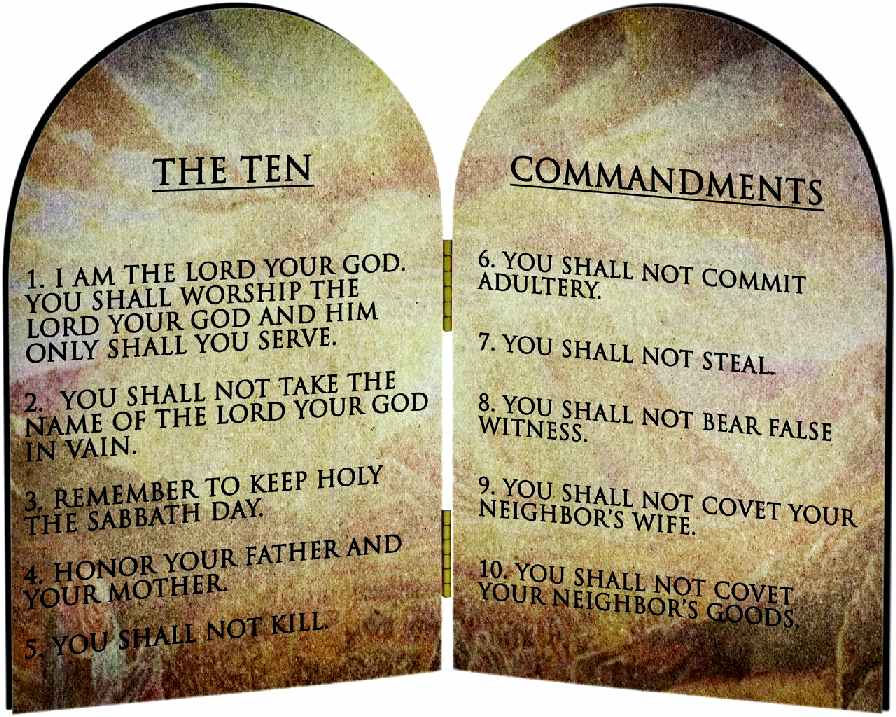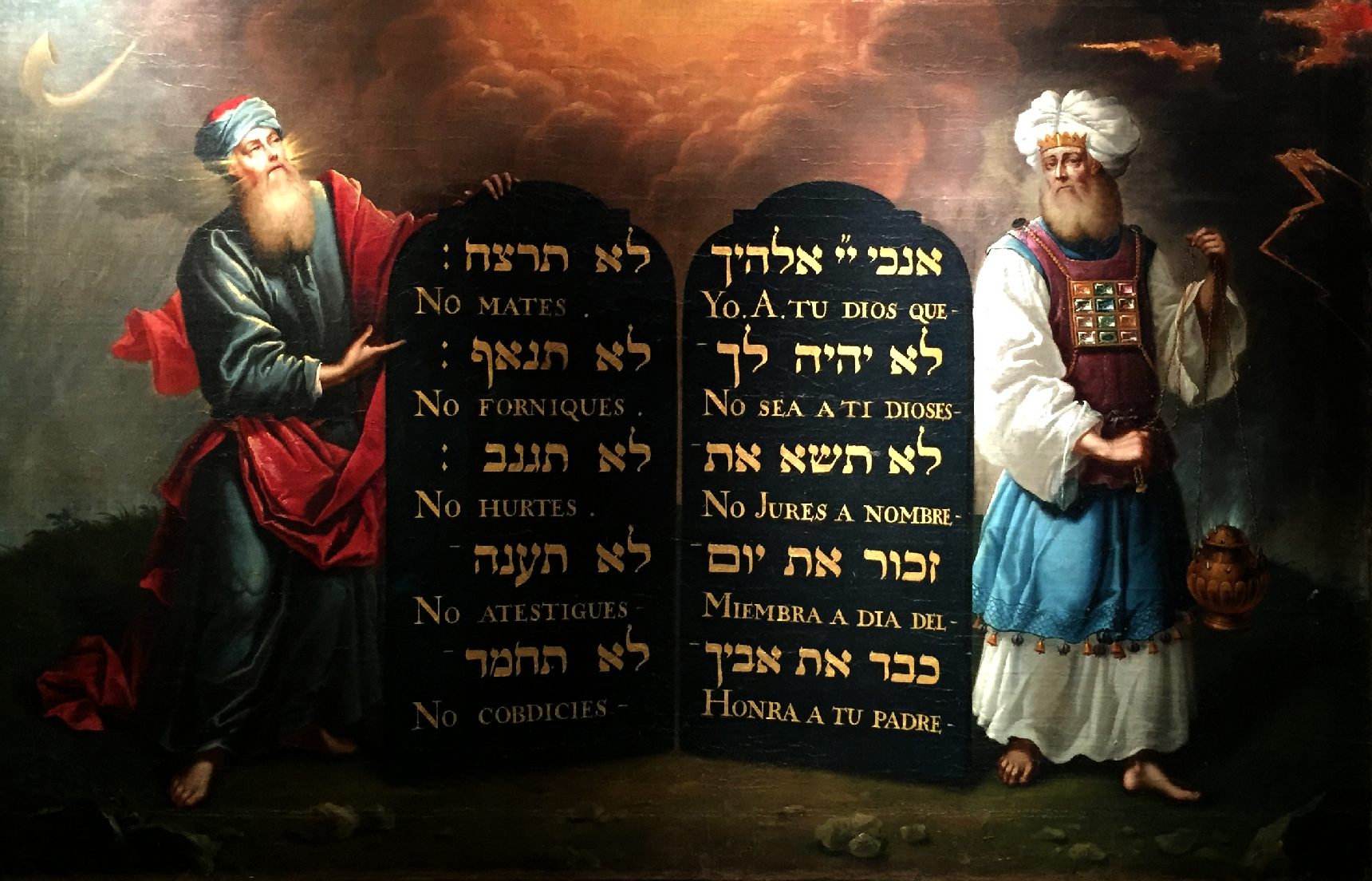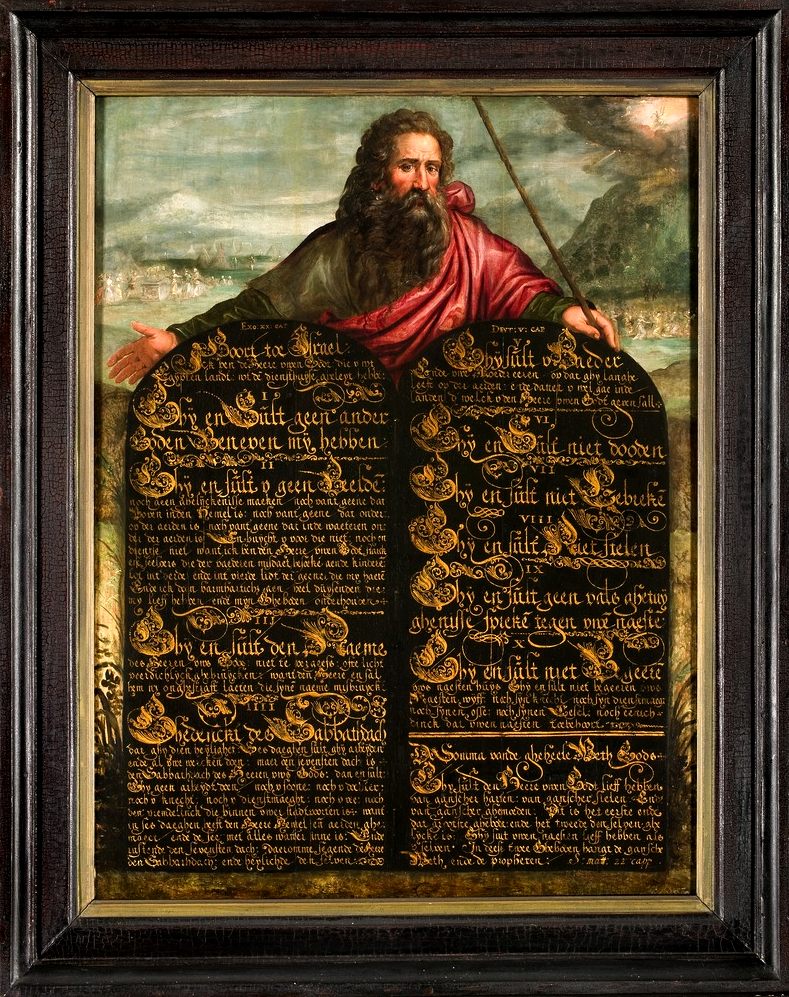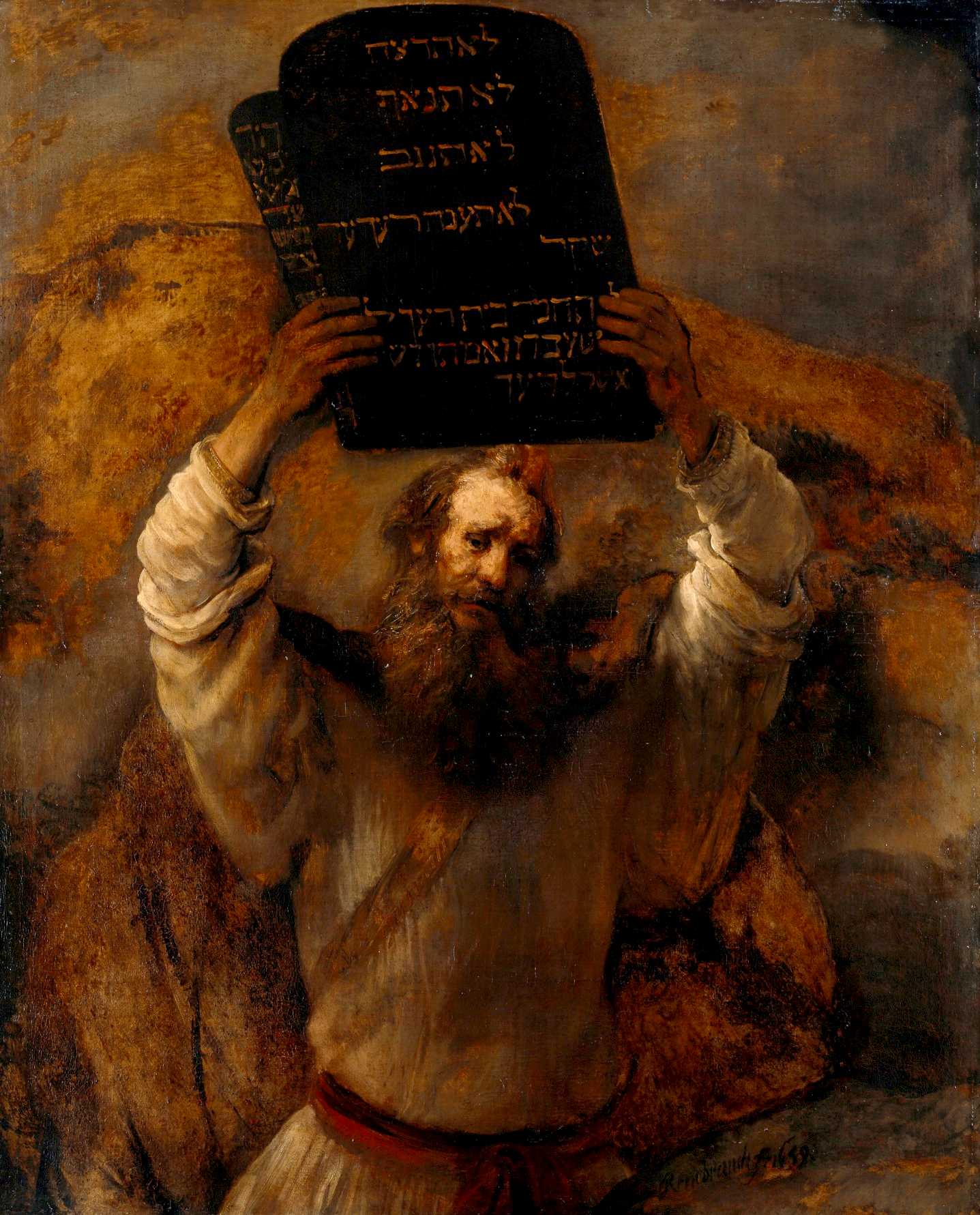|

We
are but humans and weak, with survival instincts that naturally violate
any thinking man's code of morality. All of us will have had thoughts to
break the code set down in ages past and written in the Hebrew Bible. Many
of us will haven broken one or more of the Commandments, as sinners,
eventually repenting and leading a more enlightened life with forgiveness
from on high.
We
are all sinners to some degree. We should thus understand and help other
sinners to mend their ways, be fair and kind to neighbours, not steal,
murder or commit adultery. Though in a modern world of equality these
values have altered so much that few observe the first four Commandments,
even where they are good in heart.
Others
will never see the light of day, let alone enter the Kingdom of Heaven, or
depart this world restfully, as with heavy hearts they continue to violate
the code of old until they join mother earth as part of the cycle that
brings forth new life and another chance for the living to shape the world
they inhabit while human.
The Ten Commandments (Hebrew: עֲשֶׂרֶת הַדִּבְּרוֹת, Aseret ha'Dibrot), also known as the Decalogue, are a set of biblical principles relating to ethics and worship, which play a fundamental role in Judaism and Christianity. The commandments include instructions to worship only God, to honour one's parents, and to keep the sabbath day holy, as well as prohibitions against idolatry, blasphemy, murder, adultery, theft, dishonesty, and coveting. Different religious groups follow different traditions for interpreting and numbering them.
The Ten Commandments appear twice in the Hebrew Bible, in the books of Exodus and Deuteronomy. Modern scholarship has found likely influences in Hittite and Mesopotamian laws and treaties, but is divided over exactly when the Ten Commandments were written and who wrote them.

RELIGIOUS INTERPRETATIONS
The Ten Commandments concern matters of fundamental importance in Judaism and Christianity: the greatest obligation (to worship only God), the greatest injury to a person (murder), the greatest injury to family bonds (adultery), the greatest injury to commerce and law (bearing false witness), the greatest inter-generational obligation (honour to parents), the greatest obligation to community (truthfulness), the greatest injury to moveable property (theft).
The Ten Commandments are written with room for varying interpretation, reflecting their role as a summary of fundamental principles. They are not as explicit or detailed as rules or many other biblical laws and commandments, because they provide guiding principles that apply universally, across changing circumstances. They do not specify punishments for their violation. Their precise import must be worked out in each separate situation.
The Bible indicates the special status of the Ten Commandments among all other Torah laws in several
ways where they have a uniquely terse style.
Of all the biblical laws and commandments, the Ten Commandments alone are said to have been "written with the finger of God" (Exodus 31:18).
The stone tablets were placed in the Ark of the Covenant (Exodus 25:21, Deuteronomy 10:2,5).
JUDAISM
The Ten Commandments form the basis of Jewish law, stating God's universal and timeless standard of right and wrong – unlike the rest of the 613 commandments in the Torah, which include, for example, various duties and ceremonies such as the kashrut dietary laws, and now unobservable rituals to be performed by priests in the Holy Temple. Jewish tradition considers the Ten Commandments the theological basis for the rest of the commandments; a number of works, starting with Rabbi Saadia Gaon, have made groupings of the commandments according to their links with the Ten Commandments.
A conservative rabbi, Louis Ginzberg, stated in his book Legends of the Jews, that Ten Commandments are virtually entwined, that the breaking of one leads to the breaking of another. Echoing an earlier rabbinic comment found in the commentary of Rashi to the Songs of Songs (4:5) Ginzberg explained—there is also a great bond of union between the first five commandments and the last five. The first commandment: "I am the Lord, thy God," corresponds to the sixth: "Thou shalt not kill," for the murderer slays the image of God. The second: "Thou shalt have no strange gods before me," corresponds to the seventh: "Thou shalt not commit adultery," for conjugal faithlessness is as grave a sin as idolatry, which is faithlessness to God. The third commandment: "Thou shalt not take the name of the Lord in vain," corresponds to the eighth: "Thou shalt not steal," for stealing result in false oath in God's name. The fourth: "Remember the Sabbath day, to keep it holy," corresponds to the ninth: "Thou shalt not bear false witness against thy neighbor," for he who bears false witness against his neighbor commits as grave a sin as if he had borne false witness against God, saying that He had not created the world in six days and rested on the seventh day (the holy Sabbath). The fifth commandment: "Honor thy father and thy mother," corresponds to the tenth: "Covet not thy neighbor's wife," for one who indulges this lust produces children who will not honor their true father, but will consider a stranger their father.
The traditional Rabbinical Jewish belief is that the observance of these commandments and the other mitzvot are required solely of the Jewish people and that the laws incumbent on humanity in general are outlined in the seven Noahide laws, several of which overlap with the Ten Commandments. In the era of the Sanhedrin transgressing any one of six of the Ten Commandments theoretically carried the death penalty, the exceptions being the First Commandment, honouring your father and mother, saying God's name in vain, and coveting, though this was rarely enforced due to a large number of stringent evidentiary requirements imposed by the oral law.
|
No.
|
Exodus
20:2-17
|
Deuteronomy
5:6-21
|
|
-
|
-
|
-
|
|
1
|
2
I am the LORD your God, which have brought you out of the land
of Egypt, out of the house of bondage. 3 You shall have no other
gods before me.
|
6
I am the LORD your God, which brought you out of the land of
Egypt, from the house of bondage. 7 You shall have none other
gods before me.
|
|
2
|
4
You shall not make unto you any graven image, or any likeness of
any thing that is in heaven above, or that is in the earth
beneath, or that is in the water under the earth: 5 You shall
not bow down thyself to them, nor serve them: for I the LORD
your God am a jealous God, visiting the iniquity of the fathers
upon the children unto the third and fourth generation of them
that hate me; 6 And showing mercy unto thousands of them that
love me, and keep my Commandments.
|
8
You shall not make you any graven image, or any likeness of any
thing that is in heaven above, or that is in the earth beneath,
or that is in the waters beneath the earth: 9 You shall not bow
down thyself unto them, nor serve them: for I the LORD your God
am a jealous God, visiting the iniquity of the fathers upon the
children unto the third and fourth generation of them that hate
me, 10 And showing mercy unto thousands of them that love me and
keep my Commandments.
|
|
3
|
7
You shall not take the name of the LORD your God in vain; for
the LORD will not hold him guiltless that taketh his name in
vain.
|
11
You shall not take the name of the LORD your God in vain: for
the LORD will not hold him guiltless that taketh his name in
vain.
|
|
4
|
8
Remember the sabbath day, to keep it holy. 9 Six days shall you
labour, and do all your work: 10 But the seventh day is the
sabbath of the LORD your God: in it you shall not do any work,
you, nor your son, nor your daughter, your manservant, nor your
maidservant, nor your cattle, nor your stranger that is within
your gates: 11 For in six days the LORD made heaven and earth,
the sea, and all that in them is, and rested the seventh day:
wherefore the LORD blessed the sabbath day, and hallowed it.
|
12
Keep the sabbath day to sanctify it, as the LORD your God has
commanded you. 13 Six days you shall labour, and do all your
work: 14 But the seventh day is the sabbath of the LORD your
God: in it you shall not do any work, you, nor your son, nor
your daughter, nor your manservant, nor your maidservant, nor
thine ox, nor thine ass, nor any of your cattle, nor your
stranger that is within your gates; that your manservant and
your maidservant may rest as well as you. 15 And remember that
you were a servant in the land of Egypt, and that the LORD your
God brought you out thence through a mighty hand and by a
stretched out arm: therefore the LORD your God commanded you to
keep the sabbath day.
|
|
5
|
12
Honour your father and your mother: that your days may be long
upon the land which the LORD your God giveth you.
|
16
Honour your father and your mother, as the LORD your God has
commanded you; that your days may be prolonged, and that it may
go well with you, in the land which the LORD your God giveth
you.
|
|
6
|
13
You shall not kill.
|
17
You shall not kill.
|
|
7
|
14
You shall not commit adultery.
|
18
Neither shall you commit adultery.
|
|
8
|
15
You shall not steal.
|
19
Neither shall you steal.
|
|
9
|
16
You shall not bear false witness against your neighbour.
|
20
Neither shall you bear false witness against your neighbour.
|
|
10
|
17
You
shall not covet your neighbour's house, you shall not covet
your neighbour's wife, nor his manservant, nor his maidservant,
nor his ox, nor his ass, nor any thing that is your neighbour's.
|
21
Neither shall you desire your neighbour's wife, neither shall
you covet your neighbour's house, his field, or his manservant,
or his maidservant, his ox, or his ass, or any thing that is
your neighbour's.
|

THE JEWISH AND HEBREW TEN COMMANDMENTS
For the Jews, the Ten Commandments are a special set of spiritual laws that the LORD Himself wrote on two stone tablets (luchot) that Moses brought down from Mount Sinai. In the Scriptures these laws are called the “aseret hadevarim,” the “ten words” or “ten utterances”. In rabbinical writings, they are usually referred to as “Aseret haDiberot,” and in Christian theological writings they are called the Decalogue which is derived from the Greek name “dekalogos” (ten statements) found in the Septuagint (Exodus 34:28, Deuteronomy 10:4), which is the Greek translation of the Hebrew name.
To the Jews the Torah has a total of 613 commandments which includes the ten from the Decalogue. Traditional Rabbinical Jewish belief is that these commandments apply solely to the Jewish people. Many of these laws were instituted because of sin (example Passover) and hence were in fact only for the Jews because the Gospel did not go to the Gentiles until after the sacrificial law ended at the cross. But the Ten Commandments of course are very much a standalone law for all mankind. They were written by the finger of God, personally spoken by God and were stored in the inside of the Ark of the Covenant under the mercy seat, which represented the very presence of God. Clearly the Ten Commandments are extremely important to God. Most of these other laws have now ended but not so with the Ten Commandments. Some examples of the other laws were unclean (unhealthy) foods, laws to prevent the spread of leprosy, mold in houses or a woman being unclean once a month. Lately I have begun to see attempts to diminish the importance of the Ten Commandments by saying there are 613 laws. But it is obviously not wisdom to compare laws to stop the spread of disease for example to the Ten Commandments that God wrote in stone!
|
No.
|
Jewish Ten Commandments
|
|
-
|
-
|
|
Aleph
|
I am the Lord your
God who has taken you out of the land of Egypt.
|
|
Bet
|
You shall have no other gods but me.
|
|
Gimmel
|
You shall not take the name of the Lord your
God in
vain.
|
|
Dalet
|
You shall remember the Sabbath and keep it Holy.
|
|
Hey
|
Honor your mother and father.
|
|
Vav
|
You shall not murder.
|
|
Zayin
|
You shall not commit adultery.
|
|
Chet
|
You shall not steal.
|
|
Tet
|
You shall not bear false witness.
|
|
Yod
|
You shall not covet anything that belongs to your
neighbor.
|

LINKS
& REFERENCE
https://en.wikipedia.org/wiki/Ten_Commandments
http://www.the-ten-commandments.org/the-ten-commandments.html
https://lifehopeandtruth.com/bible/10-commandments/the-ten-commandments/10-commandments-list/
BIBLICAL
OFFENDERS FROM 1939 TO 1945
|

Adolf
Hitler
German
Chancellor
|

Herman
Goring
Reichsmarschall
|

Heinrich
Himmler
Reichsführer
|

Joseph
Goebbels
Reich Minister
|

Philipp
Bouhler SS
NSDAP
Aktion T4
|

Dr
Josef Mengele
Physician
Auschwitz
|
|

Martin
Borman
Schutzstaffel
|

Adolph
Eichmann
Holocaust
Architect
|

Rudolf
Hess
Commandant
|

Erwin
Rommel
The
Desert Fox
|

Karl
Donitz
Kriegsmarine
|

Albert
Speer
Nazi
Architect
|
HOME |
AFFORDABLE | CLIMATE
| DEVELOPERS | ECONOMY
| FLOOD | HISTORY
| HOMES LADDER
| MORALS
| POVERTY
| PROPERTY | SLAVERY
| TAXES | SLUMS |
VALUATIONS | WEALTH
|














